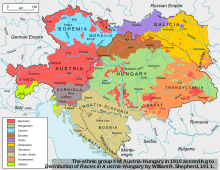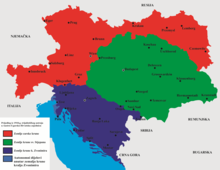Trialism in Austria-Hungary
In the history of Austria-Hungary, trialism was the political movement that aimed to reorganize the bipartite Empire into a tripartite one, creating a Croatian state equal in status to Austria and Hungary.The movement originated in the 1880s in aristocratic and clerical circles of the Empire as a reaction to Hungarian nationalism[3] and must be contrasted to the revolutionary, secessionist Yugoslavism, as Trialism worked within the Habsburg state apparatus with support from Croat politicians and Austrian officials, including the Archduke Franz Ferdinand.[1] The hope of trialist Austrian imperialists was that Serbia might eventually join the great Croatia that was to be created, while putting pressure on the Hungarians and allowing Vienna to continue to dominate the Empire as a whole.officer who advocated the idea of trialism in his book The South Slav Question, Dr. Aleksandar Horvat, leader of the pro-monarchy Pure Party of Rights and Croatian delegate at the signing of the trialist treaty in Vienna and Budapest 1918.[18] According to the Croatian delegation in Budapest after the signing the trialist manifest Count Istva Tisza stated "Ich sehe ein, dass wir gegenüber Kroatien grosse Fehler begangen haben" (I realized that we have made some great mistakes towards Croatia).



Ivo PilarAustria-HungaryCroatianAustriaHungaryFranz FerdinandYugoslavismPan-SlavicAustro-Hungarian Compromise of 1867Croatian-Hungarian Compromise of 1868IstriaDalmatiaBosnia-Herzegovina1848-49 defeat of the Hungariansempire of Austriakingdom of Hungarykingdom of CroatiaStjepan SarkotićSvetozar BorojevićJosip ŠtadlerSlovene LandsTriesteArchduke Leopold SalvatorCrown Prince RudolfArchduke Franz FerdinandSerbian nationalistsassassination in SarajevoEmperorKarl I & IVWorld War INational CouncilPure Party of RightsIvo FrankIstvan TiszaSándor Wekerleself-determinationState of Slovenes, Croats and SerbsAustro-SlavismCzechoslovakia–Yugoslavia relationsEthnic federalismTriune KingdomUnion of Hungary and RomaniaABC-CLIOBudisavljević Srđan